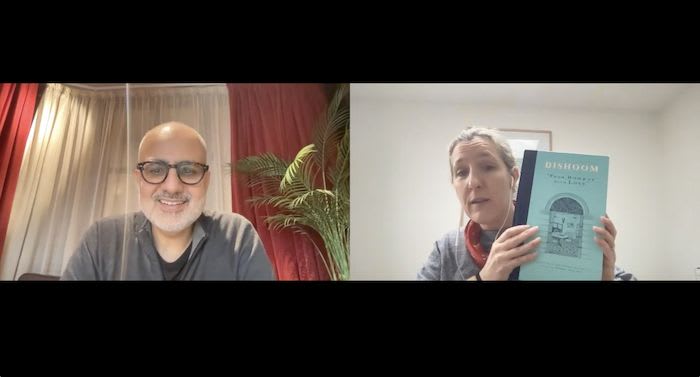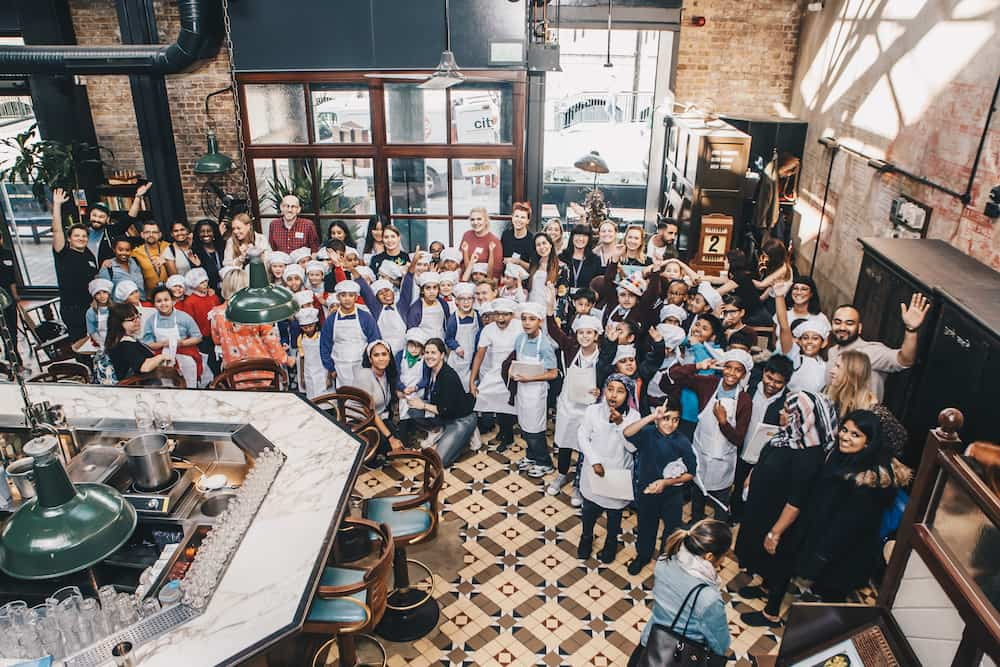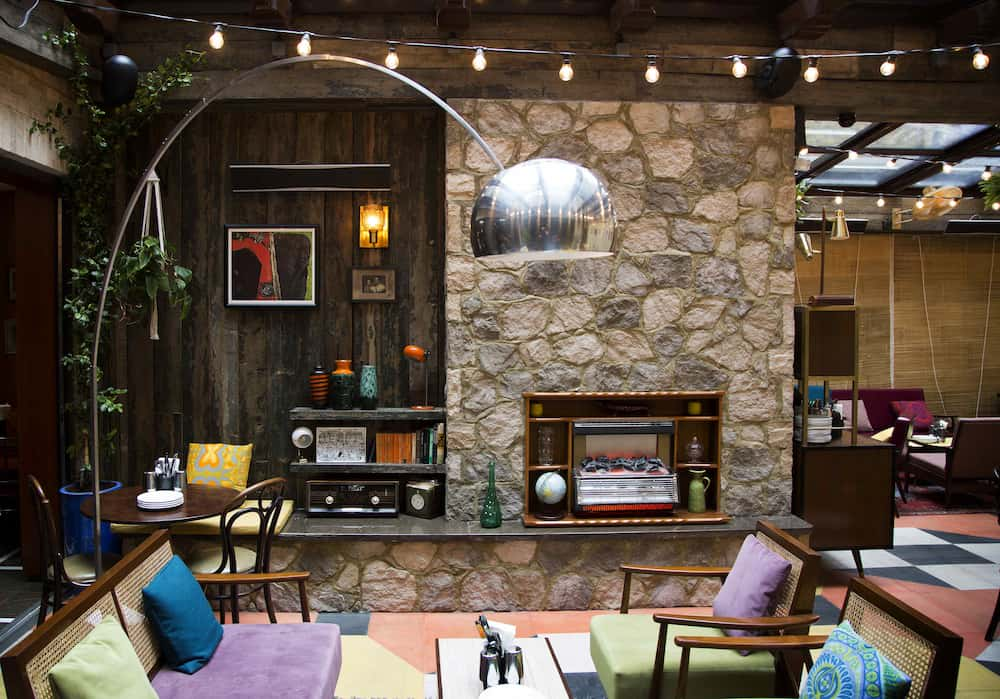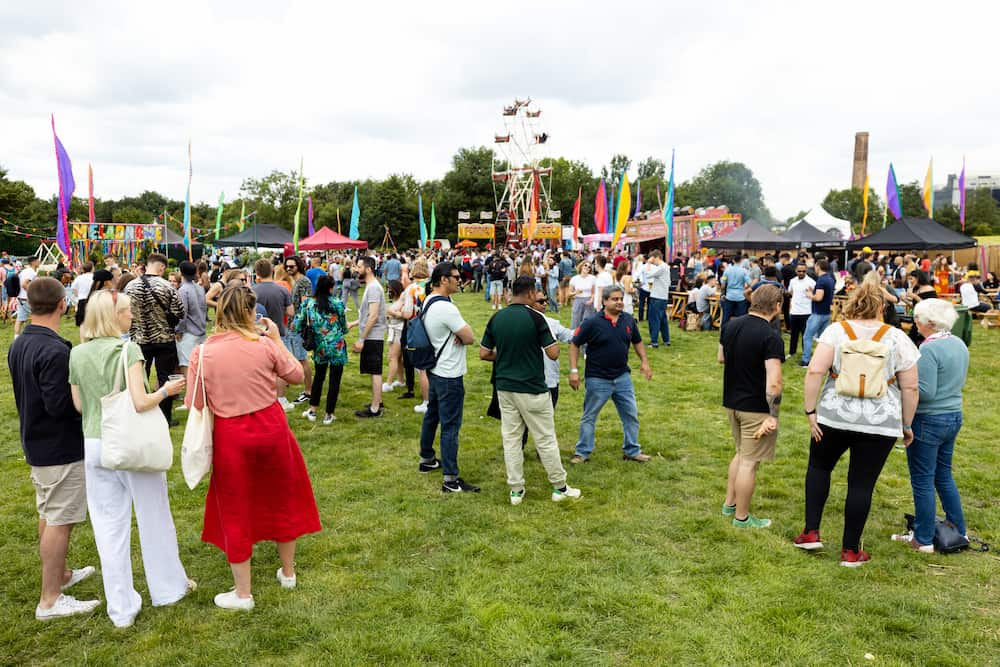For this Building Better Business interview we visit Dishoom.
It's one of the world's most talked about restaurant groups, with locations throughout the UK and a cult following. It was inspired by the Irani cafés which were popular across Bombay in the 1960s.
Co-founder Shamil Thakrar and his team set an objective to keep the jobs of all Dishoom staff during the pandemic, and is rightly proud that the business achieved this.
Dishoom's careers page describes the efforts they undertook as "None of it was cool or sexy or fun, the sort of stuff that wins awards or gets social media likes – just honest, big-hearted human beings grafting to get one another through and leave no-one behind."
Shamil joined us to talk about Dishoom's business philosophies and how they centre around quality, customers, colleagues and community.
He explains why growth isn't the only focus, and why his advice to budding entrepreneurs is to "nurture your own weirdness".
Shamil, tell us all about Dishoom. What's the 'origin story', as Marvel fans would say?
"I feel like I should have something a bit more dramatic to say - the origin story was a bit prosaic, but it turns poetic.
We had an instinct that Indian food and culture in Britain was probably represented by a series of clichés. The relationship between Britain and India is a long one. We're all learning a different way of thinking about history and sometimes a long relationship can get quite complacent.
Certainly in 2005 to 2010, we felt Indian culture in the UK was thought of in clichés, perhaps Bollywood, cricket, days of the Raj, maharajahs, palaces and curry houses.
We thought there was much more subtlety, so many more interesting things. Even the food we were exposed to was “curry house food”; don't get me wrong, it's a great institution, probably a British institution.
Curry houses date back to the 18th and 19th centuries, but it was the tradition of Lascar sailors from Bengal who came over and cooked in the Mughlai style. It was food that was served at the courts, with courtly traditions.
And it's good food – but when you go somewhere like Mumbai, you’ll see very different food eaten on the streets and in cafes - food that everyday people eat. I felt there was a lot to be said about that – a need to reframe how we thought about this culture.
Britain is very close to India because of all the immigration and the historical links. So that was part of the impetus but there was also a commercial impetus – that’s where it gets even more prosaic – that we realised that when you went to eat Indian food, you’d either go to a curry house, or you'd go to Benares, which is excellent, but more of a fine-dining approach. There wasn’t much between the two ends of the spectrum.
In 2010 it started to turn poetic. We started falling in love with what we found - this rich and very deep seam of heritage in the Irani cafes, and we felt that was a helpful way to think about the cosmopolitan traditions of Bombay.
We felt we could use food to tell stories about the city, and that’s come out in the Dishoom cookery book, which is full of these stories. So that’s where I think it started in prose and ended up in poetry.
We had a commercial idea to begin with, but for me, for something to work successfully as a consumer brand, it needs to have a bit of poetry at its heart.
That’s what’s behind the quote right at the beginning of the book, from my dad, and it’s true for us.

We feel that people are motivated by something very poetic. We want Dishoom to both be beautiful and moving; it should be aesthetically lovely and move you somehow emotionally.
We want to achieve two things:
We want to leave our customers in a better emotional state than when we found you, and for our colleagues and team members, we want to enhance their lives.
We think those two things are both equally important."

What are the management or business philosophies behind Dishoom?
" There are two halves to our philosophy and our leadership approach.
Back in 2010, 2011, with our first restaurant, revenues were okay; we had two or three thousand customers a week - it was good, but we needed to go a lot further.
We realised that we were managing things using the wrong principles. I've done an MBA and worked at Bain and Company, and they teach you very sensible things.
One of the 'pieces of software' that stick in your head is the importance of profit and loss (P&L). And all of us in business suffer from the fallacy that P&L is how you should drive your business. To some extent, that’s true, but it's a bit like telling a pianist that the reason you should work is because of the applause, and it's not; it’s because of 'the thing.
We realised that 'the thing' that made it work for us were three simple things - awesome food and drink, awesome service and a happy team.
If you control the costs, the revenue and the profit are the applause that follows from doing a good job.
So our business philosophy was born there – to maximise the value of the business because we wanted to make a great business. To do that, you can't focus on the profits; you need to focus on something else. Negotiating the price of lamb chops every 10 minutes doesn't help quality. When no one was around in the restaurant, sending the staff home in the afternoon wouldn’t help us make a happy team.
So we focused on quality, and the revenues grew massively! A focus on quality meant that word of mouth kicked in, and marketing sorted itself out. The restaurants were busy, so the staff were happy because they were busier, and we could pay them more.
Everything just started working once we started focusing on quality rather than profit alone. We’ve begun to call this 'Seva' – it’s the Hindi word for selfless service.
We think of 'Seva' in two parts - you are most alive when you are giving most fully of yourself, and you give most fully of yourself when you give your heart and your mind.
I think we're all hardwired for altruism; we’re all about relationships.
Let's say I'm mixing you a drink, and we’re sitting across the bar. It has to be an act of generosity - I want to give you this Old-Fashioned, I want to do something for you.
And the second thing is that it's not going to be just an Old-Fashioned, it’s got to be the best Old-Fashioned you've ever drunk - I need to perform to a high standard.
We call this generosity and high standards “big heart and first-class”. Together, they make up 'Seva'. If you can bring those two together, alchemy happens.
People develop really well; it becomes a very generous place, you look after customers, you look after your team. It sounds so simple - high standards and generosity - but it makes a big difference in how we work together.
So that’s the first half of our business philosophy and leadership approach.
The second part is poetry; we believe that for something to be truly special, it needs to have something beautiful, something poetic.
If one aspect of people is that relationships are key in who we are, I think the second aspect is the importance of story. We make sense of the world through story.
Everyone has their own stories, for example how you think about your childhood. Even money is a story - we only use money because we believe in the 'story of money', which is that somebody somewhere is going to pay you for something, that they in turn value it.
So for me, it made sense that if we were trying to think about culture and bring alive this idea of India and Mumbai, then it made sense to create imaginary protagonists.
We eventually ended up with lots of these different fictional owners of each Dishoom restaurant. We always write one, and they’re on our blog - each restaurant gets its own character and personality.
When you design something, you can go to a designer and say, give me mid-century Mumbai, but you can have much more texture if you provide them with a story.
For example, our Carnaby restaurant is based around the 1960s and the music scene. The protagonist has spent time in London. He was maybe dancing in the AdLib with Jean Shrimpton and David Bailey.
He went back to Mumbai, his father had a café, and he's in the rock scene, but he likes Rothko and Allen Ginsberg and Jack Kerouac. He likes modernist artists. You might think that’s dissonant in an Indian restaurant - why is there a Rothko print on the wall, why is there a Jimi Hendrix record in the corner.
But people aren’t consistent, they're often quite weird. People have very odd habits and very odd hobbies, and it's good. So I think it's more natural to be weird than it is to be flat, and that allows you a lot more fun and eccentricity.
I don't know if everyone notices this stuff, but I think customers read it subconsciously. And just as you and I might enjoy a piece of music by Miles Davis, we might not know anything more about it than it’s beautiful music.
We have no idea what key it’s in or what style it is; that’s the composer’s job. And it's similar for us; we use that narrative as a sort of scaffolding to create something that you can come into and relate to in a very different way."

You’ve pulled two very separate but very connected elements together. The fact Dishoom adds a storytelling aspect to business philosophy is interesting because food is so evocative and such an act of generosity.
"That is interesting; I suppose that food is literally visceral because the viscera don't work without it. But then there’s another level of visceral, which is relationships, and then the next level of visceral is story.
When we were all cave people, we sat around the fire because we had to, for warmth and safety. And what did we do around the fire – we ate, we deepened relationships, and we told stories. And people who didn't do that wandered off into the bush and got eaten by sabre-toothed tigers!
In terms of our gene pool, we are all the people who sat there and in around the fire and ate food, created relationships and told stories. I'm making slightly light of this, but I think that there's truth in that we've evolved as a race to find safety in those three things: food, relationships, and stories.
There's a tremendous amount of research to support this – there’s a Harvard study, which Robert Waldinger, the Dean of Harvard Medical School, does a great talk about. The number one indicator of a happy and healthy later life is the quality and depth of your relationships."
You're going to be both happy and healthy if you have great relationships.
That makes a lot of sense – and those relationships can be at home and at work. We come back to the concept of community here; whether it’s local communities or professional communities - these are foundational, secure spaces that help us build and grow. Speaking of building, what’s next for Dishoom?
"Slowly and steadily. We started thinking deeply about things we cared about. We call them 'articles of faith' and keep them on a few slides so that we can revive them every time we meet together.
One of our articles of faith is three words: 'deepen, don't dilute.'
We will only grow at the rate which is consistent with a deepening of quality.
I think many of us have mistaken assumptions about growth – you write a business plan, you get funding, and there’s an assumption you'll maintain quality. I think it has to be the other way round.
We need to think about how do we deepen quality. Growth is only the output; it’s not the input.
Clearly, we all live in a private equity world, where we’re trying to connect the lines between entry in value and exit multiples - you get finance as an entrepreneur by talking up your growth plans. It's just the way it is.
However, I think that's not a value-maximising strategy. I think it's better to go more slowly. We are the tortoise in this race - I really believe that slow is smooth and smooth is fast."
What have been the biggest hurdles you've overcome, either as a business or a leadership team? And what did you learn?
"Coronavirus was very hard, probably the biggest test of our team.
We recently went away with a senior team of 15 people, operational managers responsible for 1200 staff, and we had a look back at how we did in the pandemic. Every single one of them said that our cultural values held true during the pandemic. I don't think any of us thought it was easy, of course.
We didn't lay anyone off. We took decisions more slowly. We topped everyone’s salary up. We made a commitment at the beginning that our objective was to take everyone to the other side in the boat with us, and we managed to achieve that.
We had to work hard for that; we borrowed money and took on more debt. We also launched a delivery business; we launched a meal-kit business. So we've been very busy and entrepreneurial.
We use a lot of analogies – my latest one is that it’s a bit like the Millennium Falcon with lots of bits bolted on, and we've got to make it work. We'll figure it out and make it work; we just need to get back into a rhythm of doing things."
Tell us about the programs and initiatives that Dishoom supports that are helping to change the world
"The first is “a meal for a meal” - we support two charities, The Akshaya Patra Foundation and Magic Breakfast. That’s been in place since about 2015.
We were sitting around the table during Ramadan, and we asked our chef, who is Muslim, what is Ramadan about? He said it’s about depriving yourself so that you can know what it is to have very little. We started donating a meal for every meal we served in the restaurant, and we've just hit 12 million meals donated to children over the last seven years.
We visit some of the schools that we help in Mumbai, and we also work with many schools here through Magic Breakfast. It’s a terrible social problem - if children don't eat in the morning, they end up not concentrating, we end up with uneducated kids - it's a disaster. So we want to do our bit to make a dent in that problem.
Something else we believe in is that we need to passionately encourage and nurture 'deliberate cosmopolitanism'.
So for me as a Hindu and Chef as a Muslim, I fast for Ramadan; every year, we do a big Iftar and a big Eid event. He fasts for Janmashtami, which is a big Hindu festival. We celebrate Eid.
A couple of years ago, we held an alcohol-free, halal celebration with a thousand people, Muslim spoken word, Muslim artists and Qawwali. And about half of those who attended were not Muslim.
When people celebrate each other's traditions, cultures and religions, the world can change. We end up de-escalating everything.
When people are different to us, we 'other' them. We end up in a different place to them. We need to bring people together much more than we do.
The third thing we’re doing to make a better world is making Dishoom a great place to work. I think that's a service if we can raise the standards of work in the hospitality industry.
We were number 12 on Glassdoor this year, which is really nice, and we were number four in the UK Best Companies to Work For survey - and top in hospitality in both of those surveys. We don't always get it right, but we work super hard on making sure Dishoom is a great place to work."

That takes us neatly into the next question, about business and community. Do you think it's possible to build a successful business in 2022 without thinking about how community (or communities) will support it? What does community mean to you?
"What does community as a word mean? Perhaps common interest, and common is the root of that word? I’m not sure about B2B businesses because they're different – shipping or logistics; I don’t know how it would apply there.
If I think about the businesses I understand - consumer-facing industries like service or hospitality, we wouldn't attempt to build a business without a community.
We want to bring people across generations and cultures together over food. We want them to be together in one place and experience something together. That's really, really important for us.
How does that benefit us? Whether it’s Eid or Diwali or Holi, the work we do - when we bring people together, I think we can create some magic and some real love. For us, it's absolutely critical.
Can you create a business without community? You probably could…I’m thinking, is there a McDonald's community or a Pret community? They’re pretty successful businesses…
But we do have communities in our business; for example, we bring in suppliers in our annual Family Mela. We shut down the restaurants for a day, and we basically create a festival with our team and their families, our suppliers and their families, around 2,000 people, and it's brilliant. That really creates community.
I think you're leaving an enormous thing on the table if you're trying to create a business without any community. I don't think it's a thing.
For example, that might not be obviously linked to community at first glance. We’ve just finished our cricket league – the Dishoom Premier League, which we hold at Lord's. All our restaurants and the delivery kitchens play each other. We have a famous cricketer along to give the trophy, and it’s a huge thing. And that creates a massive community.
So if community is defined through the lens of relationships, building a business without it is a non-starter. You need relationships; you need to have some idea of community for anything to work.
Are you a fan of business management books or podcasts? If so, what would you recommend?
"I am - I've just listened to On Being by Krista Tippett, the episode with Jerry Colonna about whether you can really bring your whole self to work.
There’s a quote from it I’d like to share:
“without self-knowledge, work is a place that we play out and replay what has happened to us in our lives…until you make the unconscious conscious, it will direct your life, and you will call it fate….You should ask: who am I? Who have I been all my life? Then you can ask, who do I want to be? What kind of place of work do I want to live into? What kind of company do I want to build?”
That’s very good."
What advice would you give to your younger self or any young entrepreneur starting a business today?
"Connect the dots your way.
If I’ve got two dots and you and I are looking at them, we might completely miss something. Someone standing in a different place will see how things are connected differently. I might be stealing this loosely from Steve Jobs, but I think you’ve got to connect things your way.
I used to think that the world was about being good at all the things other people are good at, like spreadsheets and PowerPoint and clients and developing business insights.
But I think in the end, you’ve got to nurture your own weirdness and where you see the world radically differently and make that your living.
Jim Henson was just a guy who played with soft toys until he was Jim Henson who created the Muppets and Sesame Street and taught millions of children how to read, write and count."
What would you like to do if you weren’t doing what you’re doing now?
"I’ve got loads of stuff I’d love to do, and I’ve got loads of ideas, but I’d love to have been a filmmaker. Maybe…"
More Building Better Business Interviews
Learn from other founders, entrepreneurs and leaders who've featured in this series about better business practice.
Sam Branson, co-founder of HiddenLight and Big Change
Sarah Waddington, founder of Socially Mobile
James Timpson, CEO of Timpson
Saasha Celestial-One co-founder of OLIO
Sarah Jordan, founder of Y.O.U Underwear
Sarah Brown, founder of Pai Skincare
Ben Brooks-Dutton, Managing Partner at The Unmistakables
Amy Kean, co-founder of D.I.C.E
Join Guild 🤝
See for yourself how the Guild experience is different to WhatsApp, Slack, LinkedIn or Facebook Groups. Guild is a safe space to connect, communicate and collaborate with others.
Join us on a platform that is purpose-built for professionals and businesses.
- Just want to join some groups? Simply join Guild and then look through the discoverable groups and communities to find relevant ones to join
- Thinking of running your own community? With an elegant and simple to use, mobile-first UX you've got everything you need to start a community - custom branding, analytics, video, group and user management and support. Get started with your own community here with our free and paid plan options.
Contact us if you want to know more or have any questions.